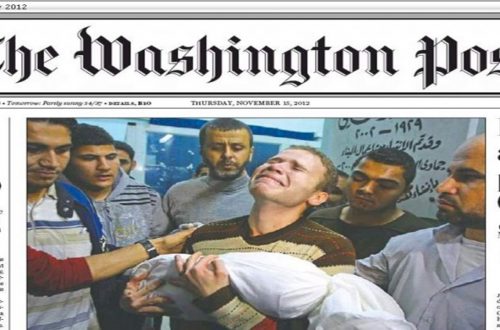Martin Shaw, advisory editor of Democratiya and a Professor of International Relations at the University of Sussex, has been debating this issue: first with David Hirsh, and then with Professor Norman Geras.
Both are opponents of the academic boycott of Israel. Both are agreed, it should be said, that it is not inherently racist to criticise the policies of various Israeli governments, or to argue for a different sort of political system in Israel. So that’s the Livingstone Formulation dealt with. So, on to the substantive argument.
One of the points of contention is this. Norm has drawn attention to the various “anti-Semitic tropes that sometimes turn up amongst boycott activists”. Martin’s view is as follows:
“Of course there are such symbols, discourses and practices. But neither Norman nor David Hirsh has provided evidence of any that actually play a significant part in the Western opposition to Israel.”
I should stress that we’re probably only talking about Western non-Muslim campaigning: as it would be hard to deny that Iran, Hamas, Hezbollah, and certain Western based Muslim extensions of these parties, were motivated by clear, and often religiously inspired, anti-semitism.
The trouble with these sorts of arguments is that they tend to proceed as follows. X demands proof of proposition A. Y provides proof. X states that the proof isn’t sufficient, or relevant. Y provides more proof. X demands proof of a particular type. Y provides proof of that type. X explains why that proof is no good at all, and asks for further proof… and so on…. And eventually, the argument stalls. Accordingly, I very much doubt that I can prove to Martin Shaw’s satisfaction, that there is an important strain of anti-semitism, structural or motivational, within a section of Israel/Palestine campaigning.
Pretty much everything that could be said on the subject, has now been said. Norm’s focus has been on the discriminatory effects of the boycott, and the tropes in anti-Zionist discourse which closely follow age-old anti-Jewish conspiracy theorising. Martin’s answer, however, has been to insist on proof of attitudinal anti-Semitism among the boycotters. He believes that there is none: or that which there is, is not significant or important. I recommend you read the discussion. However, I’d like to take this opportunity to share an example of a person who has been involved at the highest level of anti-Israel campaigning, whose beef is explicitly with what he calls “Jewish Power”.
That person is Francis Clark-Lowes, former National Chair of the Palestine Solidarity Campaign: the pre-eminent pro-boycott campaiging organisation.
Francis Clark-Lowes was chair of the PSC between 1998 and 2001, and claims to have prevented the PSC from collapsing when, after Oslo, it looked as if they were going to be disappointed by Fatah’s apparently willingness to make peace with Israel. At that time he was a Graduate Research Assistant in the University of Sussex Centre for German Jewish Studies. Perhaps Professor Shaw knows him.
Here are a few extracts from an article by Clark-Lowes which illustrate his thinking:
Everyone seemed so scared that we might be branded as antisemitic, and that this would be a disaster. But there was one person who did not think this way. I had met Paul Eisen, the UK Director of Deir Yassin Remembered, in the late nineties. His attitude to his own Jewish roots and his confronting of much wider issues such as ‘the Holocaust’, questioning the shibboleths about the Nazi period in Germany, looking again at Jewish history and the hatred of Jews, and embracing the concept of Jewish power – all of these gave me permission, as it were, to explore these areas for myself. Having been married to a Viennese woman for seventeen years, the re-evaluation of recent German history was a subject close to my heart.
Paul has become a good friend. I trust his integrity, and I am strongly opposed to the kind of vilification which certain self-appointed guardians of correct thinking feel it their role to heap upon him and upon his friends such as Gilad Atzmon and Israel Shamir. The power behind such attacks is drawn from the very same source that oppresses the Palestinians. Sadly even anti-Zionists, and particulary anti-Zionist Jews, tap into this source when it suits them, without acknowleding that it exists.
…
Equally, when talking about the pressure exerted by Jews in favour of the Zionist enterprise, and more widely in favour of a particular way of seeing the world and their position in it, it seems to me perfectly reasonable to talk of Jewish power, even if many Jews do not accept the policies this pressure is designed to promote. The fact that I am considered an antisemite for saying this is an indication of the problem we face. We are, in effect, being told that free speech is all very well, but this kind of free speech is forbidden.
Perhaps I should make it clear what I mean by saying that there is a need to talk about Jewish identity. I see Zionism as the product of a national view of Jewish identity. At a time (the nineteenth century) when Jewish identity was in decline through emancipation, assimilation, intermarriage and loss of religious faith, emphasising the ancient idea of ‘the Jewish people’ and conflating that with the German conception of the nation and nationalism offered the hope of cultural survival. That in itself need not have been problematical, but the way in which Zionists achieved their objectives, against all the norms of international behaviour, by presenting Jews as victims rather than oppressors, and their opponents as antisemites, has, in my view made it necessary to deconstruct the whole ideological apparatus of Zionism. And central to this is a particular conception of Jewish identity. Of course, any questioning of this or other Jewish narratives is likely to be regarded as ‘antisemitic’, and since ‘antisemitism’ is perceived as an unanalysable disease of gentiles, and now even of some Jews, the debate is supposed to end here. It takes a lot of courage to argue on.
…
[I]n the case of Israel-Palestine the geopolitical shift in power which is required is not simply the decline of US power. I believe Zionism could survive this. It is the decline to Jewish power to a reasonable level. Every group needs power – indeed the raison d’etre of a group is that it can exercise power. The problem with Jewish power at present is that it has made itself immune from criticism and control by using the accusation of antisemitism to crush anyone who attempts to criticise it or control it.
I ask myself a simple question: ‘Do I believe a resolution of the Israel-Palestine conflict is possible without radical change in the way Jewishness is understood and privileged?’ I answer with a definitive no. The brilliant Zionist narrative, and its supporting Jewish narratives about Jewish identity, Jewish history and antisemitism, if unchallenged, will continue to provide a cast-iron case for Israeli behaviour. That is why Jewish power needs to be challenged.
The “Jewish Power” thesis that Francis Clark-Lowes is pushing, is that of the notorious neo Nazi who calls himself Israel Shamir. Paul Eisen and Gilad Atzmon are his disciples. Francis Clark-Lowes is right to be concerned that he will be identified as a racist: because he is promoting both racists, and parotting their ideas.
It is possible that Martin Shaw doesn’t know that much about “Israel Shamir” and his neo Nazi theories about Jewish Power. If he doesn’t all that he needs to know can be divined by reading this exchange between “Israel Shamir” and the British National Party’s Lee Barnes, where “Shamir” slams the fascist, Barnes, as a “Jewish overseer” of the BNP. Barnes isn’t Jewish, and Shamir knows it. It is just that “Shamir” think that he’s insufficiently racist.
Paul Eisen is another “Jewish Power” theorist, active in Palestinian Solidarity politics. He is also a supporter of the imprisoned, formerly Canadian Holocaust denier, Ernst Zundel. Eisen has also written:
Jews were certainly killed at Auschwitz whether it was because they were Jews or that they just happened to be Jews, I don’t know.
Regarding gas, again I am not sure but the evidence for the use of homicidal gas-chambers is not good at all. The evidence against it is much, much stronger.
Atzmon we all know about: the “ex-Jew” who believes that the Protocols of the Elders of Zion accurately represent the true state of Jewish power.
This is the ideological camp within Francis Clark-Lowes sits. It is the politics which he actively promotes. If you look on his website, there’s a telling section: where he sets out the study text for a course that he’s teaching. The section – entitled “The Power of the Individual Mind” – takes what Clark-Lowes regards as the “Jewish narrative”. According to Clark-Lowes:
Yet I suggest to you that almost every one of the italicised items is questionable – perhaps only the chosen people concept is not, since it is a theological idea
The italicised items, that Clark-Lowes regards as “questionable” include the following:
The Holocaust, that is the systematic murder of six million Jews in gas chambers by the Nazis.
The reason I bring up Francis Clark-Lowes in response to Martin Shaw is this. Professor Shaw does not believe that anti-semitism plays a significant part in anti-Zionist campaigning. He won’t accept evidence of structural discrimination, or the replication in some iterations of anti-Zionism, of anti-semitic themes.
However, here we have a man who was the National Chair of the Palestine Solidarity Campaign, pushing not anti-Zionism, but clear and vicious conspiricing about Jewish Power, supporting neo-Nazis, and arguing that the murder of six million Jews by the Nazis is “questionable”.
Perhaps he’s just one guy.
What I do know, is this. Last year, the nuttier end of Jewish anti-Zionism – exemplified by Greenstein and Rance, and supported by Sue Blackwell – put a motion to the AGM of the Palestine Solidarity Campaign, seeking to distance the PSC from the open racism of Israel Shamir and Paul Eisen. They were utterly defeated.
Similarly, the Socialist Workers’ Party – a major player in British anti-Zionism – repeatedly invited Gilad Atzmon to take part in various events, over four or so years, and even after a number of its members condemned his “stomach turning” racism. Michael Rosen, a left wing anti-Zionist who has campaigned with the SWP for years, pleaded to the leadership of the party to cut their links with Atzmon. The Party told him to fuck off.
Like Atzmon, Shamir and Eisen, Clark-Lowes thinks that these Jewish anti-Zionists are “tapping into the source” of Jewish Power. He links to Atzmon’s website, “Auntie Ziona Against Auntie Simone“, where the likes of Rosen, Greenstein and Rance are satirised as secret agents for Zionism, exercising Jewish Power over the foolish goyim.
Certainly, many of those who take part in anti-Zionist activity would never think of themselves as racists. Frances Clark-Lowes – a prominent national PSC activist – is certainly one of them. From his perspective, he’s simply uncovering and fighting against Jewish Power.
My question to Martin Shaw is this. Do you think that Francis Clark-Lowes is an anti-semite?


